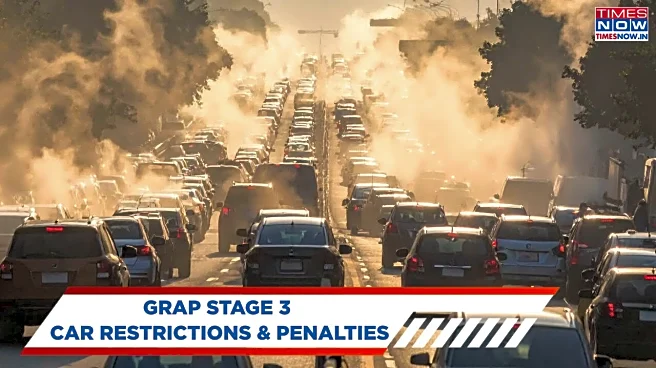With Delhi-NCR currently registering an Air Quality Index (AQI) in the “severe” range (above 400), the Commission for Air Quality Management (CAQM) recently notified that only Stage 3 of the Graded Response
Action Plan (GRAP) is active, contrary to circulating reports of Stage 4 enforcement. For car owners in the region, this means certain petrol and diesel vehicles face curbs, fines apply for non-compliance, and you should prepare your vehicle and commute strategy accordingly. Below we break down what Stage 3 means for drivers, what’s allowed, banned and what penalties you might face.
Also Read: MG Windsor Achieves 50,000-Unit Milestone — Why It’s Becoming India’s New Favourite EV
What’s Allowed And What’s Not For Cars
Under GRAP Stage 3 (triggered when AQI crosses approximately 401-450), several vehicle restrictions apply across Delhi and the surrounding NCR. These are:
- Private petrol cars meeting BS-VI norms continue to be allowed under normal conditions, though some advisory limits or congestion charges may apply.
- Private diesel cars meeting BS-VI emission standards are generally allowed, but diesel vehicles registered as BS-IV or lower face stricter checks and curbs.
- Commercial diesel vehicles (goods and passenger) registered BS-IV or below may face entry bans into Delhi from borders or have time-restricted access.
- Authorities may suspend movement of high-emitting or older vehicles even if they show valid documents, particularly in fringe or hotspot zones.
Penalties, Checks And Enforcement
Enforcement under Stage 3 is strict with significant penalties for non-compliance by vehicles. Some key details for car owners and fleet operators:
- Anyone caught driving prohibited BS-III petrol or BS-IV diesel cars can face tough action under the Motor Vehicles Act.
- Fines of up to Rs 20,000 may apply, and authorities can even impound the vehicle.
- Cars without a valid PUC also risk penalties of up to Rs 10,000, making regular renewal essential.
- Delhi Police and the Transport Department have ramped up on-ground inspections and are using digital monitoring to spot violations. The aim is to tighten enforcement and curb avoidable vehicle movement while pollution levels remain severe.
- Although Stage 4 (which would impose far stricter controls like 50% office remote work, truck bans and full vehicle restrictions) has not been activated, motorists should stay alert for any escalation.
Also Read: TVS Ntorq 125 Common FAQs — Price, Mileage, And Performance Guide
What This Means For Car Buyers And Drivers
For those driving or planning to buy a car in Delhi-NCR during this season, here are three take-aways:
- Prioritise BS-VI compliant vehicles, especially diesel ones, as older emission classes come under immediate scrutiny.
- Keep your vehicle documentation in order such as valid PUC, insurance and registration are mandatory to avoid heavy fines.
- Consider alternatives like car-pools, public transport or EVs. With air quality at severe levels, policy curbs often target high-emitter movement first.














